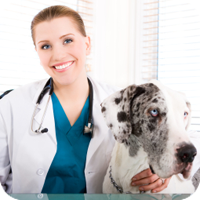
Veterinarians solemnly swears to use their scientific knowledge and skills "for the benefit of society, through the protection of animal health, the relief of animal suffering, the conservation of animal resources, and the advancement of medical knowledge."
Today’s veterinarians are in the unique position of being the only doctors educated to protect the health of both animals and people. They are not only educated to meet the health needs of every species of animal but they play an important role in environmental protection, food safety, and public health.
In taking The Veterniarian’s Oath, a doctor solemnly swears to use his or her scientific knowledge and skills “for the benefit of society, through the protection of animal health, the relief of animal suffering, the conservation of animal resources, and the advancement of medical knowledge.”
Today nearly 70,000 veterinarians are professionally active in the United States. They provide a wide variety of services in private clinical practice, teaching, research, government service, public health, military service, private industry, and other areas.
The Veterniarian’s Oath (Adopted by the AVMA):
Being admitted to the profession of veterinary medicine,
I solemnly swear to use my scientific knowledge and skills
for the benefit of society through the protection of animal health,
the relief of animal suffering, the conservation of animal resources,
the promotion of public health, and the advancement of medical knowledge.
I will practice my profession conscientiously, with dignity,
and in keeping with the principles of veterinary medical ethics.
I accept as a lifelong obligation the continual improvement
of my professional knowledge and competence.
Veterinarians in private clinical practice work to prevent disease and other health problems in their patients. They examine animal patients, vaccinate them against diseases, prevent the transmission of animal disease to people and advise owners on ways to keep pets and livestock well nourished and healthy.
When health problems develop, practitioners must diagnose the problem and treat the patients. Accurate diagnosis frequently requires the use of laboratory tests, radiography or x-rays, and specialized equipment. Treatments may involve a number of procedures including: emergency lifesaving measures, prescribing medication, setting a fracture, delivering a calf, performing surgery, or advising the owner on feeding and care of the patient. read more
View Article
Doctors of Veterinary Medicine and Veterinary Surgeons are medical professionals whose primary responsibility is protecting the health and welfare of animals and people. The term “Veterinarian” comes from veterinae, which means “working animals.” Every veterinarian has gone through extensive medical training for animals and has received a license to practice veterinary medicine.
Veterinarians diagnose and control animal diseases, treat sick and injured animals, prevent the transmission of animal diseases to people, and advise owners on proper care of pets and livestock. They ensure a safe food supply by maintaining the health of food animals. Veterinarians are also involved in wildlife preservation and conservation and public health of the human population. read more
View Article
Students interested in a career in veterinary medicine should begin their preparation by doing well in general science and biology in junior high school. They need to take a strong science, math, and biology program in high school. Admission into veterinary medical school is competitive. In fact, many people would agree that it’s just as tough if not tougher to get into a veterinary medical school compared to a human medical school.
To be considered for admission to a college of veterinary medicine, a student must first complete undergraduate preveterinary medical coursework, which usually includes three to four years of college study, with specific course requirements. Each college of veterinary medicine establishes its own preveterinary requirements. Typical requirements include basic language and communication skills, social sciences, humanities, mathematics, chemistry, and the biological and physical sciences. read more
View Article
As the pet owner you must communicate your pet’s health care needs to your veterinarian. Nobody knows your pet like you. Many signs of illness are subtle. Your veterinarian will rely on your awareness of small changes in your pet’s behavior or habits.
Take the time to choose the right veterinarian for your special pet. It is a good idea to start thinking about selecting a veterinarian before a new pet becomes a member of your family. In fact, a veterinarian can assist you in selecting a pet that complements your personality, work schedule and home life. read more
View Article

